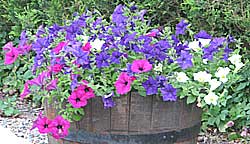Petunia - how to produce a dazzling floral display
SEASONAL TIPS
Spring - Sowing
10 weeks before the last expected frost sow petunia seed in the greenhouse.
Late Spring -
Leave the petunia seedlings outside for 14 days, birnging them in at night
to harden them off. After the last of the frosts, when the soil has warmed
up you can plant the young petunias outside - this is best done on a cloudy
day
Autumn-
Remove petunia plants once they have stopped flowering

GROWING GUIDES
PLANT SOCIETIES
PETUNIA PESTS AND DISEASES
Aphids will attack petunias - inspect for these at regular intervals and spary the pests with soft soap or your preferred insecticide
Distorted or mottled leaves are a sign that the petunia has a virus disease - destroy any affected plants and wash your hands to prevent spreading the virus to other plants.

PETUNIA CARE- ADVICE ABOUT GROWING HEALTHY PLANTS
 Petunias
are half-hardy annuals and are very popular bedding plants,
as they flower continuously throughout the summer and autumn.
Petunias
are half-hardy annuals and are very popular bedding plants,
as they flower continuously throughout the summer and autumn.
Petunias produce large, trumpet-shaped flowers in various colours - mainly pink, red, crimson, purple, blue and white.
Petunias thrive and flower best with the benefit of the full heat of the summer sun.
VARIETIES OF PETUNIA
Some varieties of petunia are striped with contrasting colour, whilst others are beautifully fringed.
There are also double varieties of Petunia.
Petunias can he divided into three separate types:
(1) large singles, 12-18 inches.
(2) large doubles, 12-18 inches,
and (3) bedding varieties, 6-i8 inches.
Types one and two of petunia are most suitable for growing in pots for the greenhouse, conservatory and patio in summer, whilst the bedding kinds are the best for planting out of doors for a summer display in the beds and borders.
Petunia Surfina is very popular for growing in hanging baskets.
RAISING PETUNIAS FROM SEED - WHEN TO SOW
Petunias are raised from petunia seeds sown in pots or boxes of finely sifted soil in February or March in a greenhouse temperature of 55-60 degrees.
The seedlings are pricked out 2 inches apart in other boxes of light rich soil, or are potted separately in 3-inch pots.
When potting or pricking out the double kinds, select the smallest of the petunia seedlings.
When the seedlings are established, they are gradually hardened off and planted out of doors in May and June.
PROPAGATING PETUNIAS FROM CUTTINGS
Named varieties of petunias, especially the doubles, may be propagated by inserting cuttings in pots of sandy soil in a cold frame in September.
The rooted cuttings must be wintered in a greenhouse with a minimum temperature of 45 degrees.
GROWING PETUNIAS IN POTS
Petunias for growing in pots are raised in the manner recommended above.
The seedlings are potted first into 3-inch pots and finally into 7 inch pots.
A compost of equal parts of loam and leaf-mould, with a little well-decayed manure and a scattering, of silver sand is suitable.
A position with lots of light is necessary for petunias to do well - avoid planting under trees or shrubs.
Occasional doses of liquid manure should be given when the plants are coming into bloom.
SPECIAL ADVICE ABOUT GROWING PETUNIAS
In early summer cut back the flowering stems of petunias - this will prevent the petunia plants from becoming too leggy.
Avoid buying petunia plants that are already in flower, or that seem to be tall and straggley - these plants will probably be pot bound and are unlikely to grow on well
GARDENING ARTICLES ON GARDEN GROWER
Advice about how to grow Petunia flowers. Propagating Petunia plants. Growing petunias from seed.